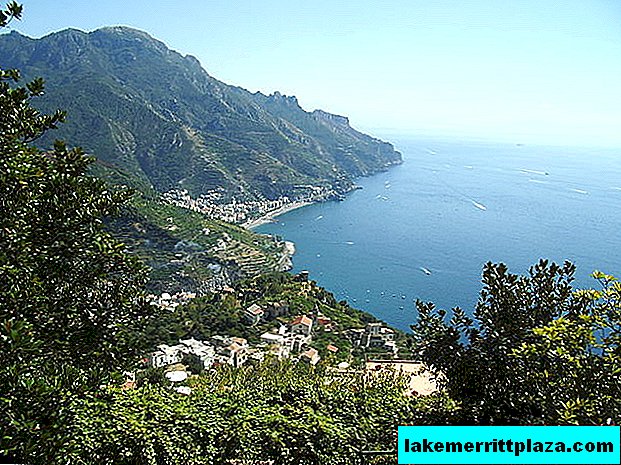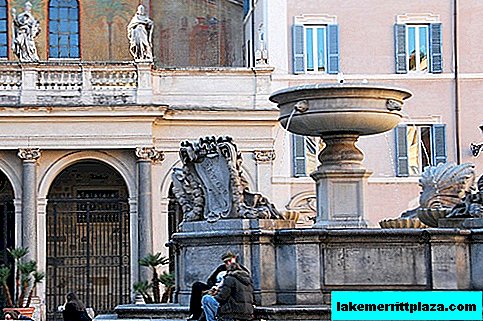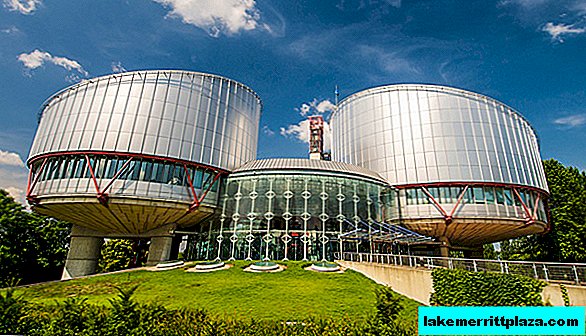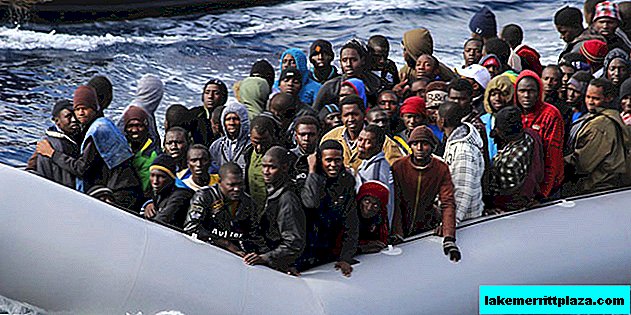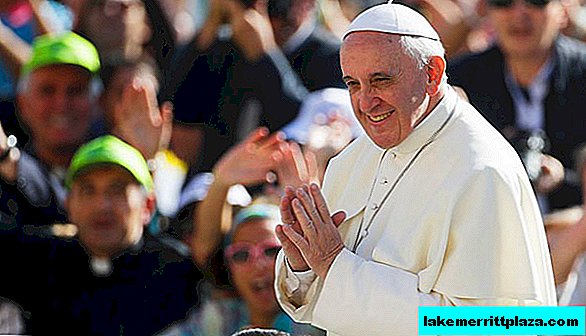Anthem of Italy from October 12, 1946 recognized song "Brothers of Italy" (Fratelli d'Italia). The text was created by the young Garibaldian poet Goffredo Mameli (Goffredo Mameli, 1827-1849). The music was composed by the famous composer and opera tenor Michele Novaro (Michele Novaro, 1818-1885). The anthem of Italy is sometimes called the "Song of the Italians" (Il canto degli Italiani) or in honor of the poet - the "Anthem of the Mameli" (Inno di Mameli).
History of creation
The anthem of Italy was composed in 1847, when the fragmented country was in a single rush of patriotism before the war with Austria (1848) and the coming unification (1861).
The author, a twenty-year-old student of Goffredo Mameli, was an active participant in the liberation movement led by Giuseppe Mazzini. At the time of writing the main poem in his life, from where the text of “Songs of Italians” was taken, Goffredo was in the rank of captain and commanded a detachment of three hundred people. He devoted his entire short life to the liberation of his homeland.
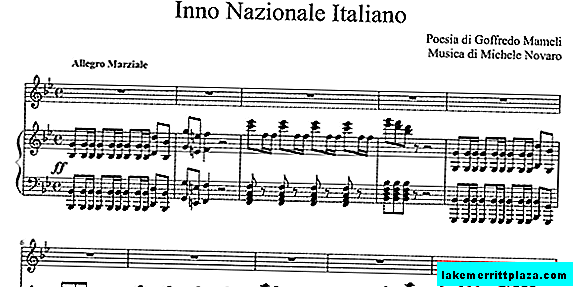
The young man fought with the Austrians in besieged Milan, where he arrived voluntarily with his detachment, then in Genoa he carried out the instructions of Giuseppe Garibaldi, defended Rome from the French.
An accidental wound interrupted the life of the young poet, he died at the age of twenty-two years from blood poisoning, even amputation of the leg did not save.
Dying, delirious, Goffredo was constantly repeating the words of his poem. Only two years remained before the proclamation of the Republic and the annexation of Rome. The young poet was buried in Rome.
The composer's personality is also interesting. Michele Novaro, like Mameli, was a native of Genoa, Italy's most musical city. He was also a loyal follower of Garibaldi, his assistance to the movement consisted in composing music for patriotic songs and raising funds. While writing music to the text, Mameli Michele Novaro was in Turin, led the choir in the theaters of Reggio and Carignano, later, already in Genoa, he created the Folk Choral School and dedicated the rest of his life to it. According to Novaro, the poetry impressed him so much that the melody was composed almost immediately. The composer did not receive any privileges, did not even have prosperity - only remarkable talent and sincere folk love were his wealth. But in one, Novaro turned out to be more successful than Mameli - he had a chance to see the beloved homeland as one, and Rome conquered with such difficulty - its capital. Faithful students buried him in a cemetery in Staglieno, next to the tomb of Mazzini - a posthumous award for an unselfish revolutionary. The first edition of The Brothers and the score of Michele Novaro are in the Genoese Mazzini Institute.
The anthem of Italy, officially approved only in 2006, immediately won people's love. The famous Thousand Garibaldi made her victorious journey with this song, she was sung at rallies, and rushed into battle with her. The anthem of Italy with the words of Mameli became the sound background of Risorgimento (il Risorgimento).
Anthem of Italy today
In the 90s. opponents of the anthem Mameli began to say that the text telling about the revolutionary struggle was outdated. As an option, Va 'pensiero, a choir of captured Jews from the third act of Giuseppe Fortunino Francesco Verdi's opera Nabucco, was proposed. Verdi himself highly appreciated Mameli's poem and believed that the “Song of the Italians” was in no way inferior to the “Marseillaise”. But the adherents insisted that changing the anthem of Italy, which was already sixty years old, was pointless. A referendum was held, following which the "Brothers of Italy" remained the official anthem.
Hymn words
The Italian anthem with the words of Mameli, although recognized by parliament, still has a temporary status, but since 2012 a law has been passed on its compulsory study in schools. Revolutionary ideas died out as unnecessary, but over the genius of modest authors years were not dominant. The translation into Russian, although inferior in melody and harmony of versification to the original, gives an idea of the feelings and aspirations of the young poet:
Original in ItalianFratelli d'italia
I
Fratelli d'Italia,
l'Italia s'è desta,
dell'elmo di scipio
s'è cinta la testa.
Dov'è la vittoria?
Le porga la chioma,
ché schiava di roma
Iddio la creò.
Chorus
Stringiamci a coorte,
siam pronti alla morte.
Siam pronti alla morte,
l'Italia chiamò.
Stringiamci a coorte,
siam pronti alla morte.
Siam pronti alla morte,
l'Italia chiamò!
II
Noi fummo da secoli
calpesti derisi
perché non siam popolo,
perché siam divisi.
Raccolgaci un'unica
bandiera, una speme:
di fonderci insieme
già l'ora suonò.
III
Uniamoci, amiamoci,
l'unione e l'amore
rivelano ai popoli
le vie del Signore.
Giuriamo far libero
il suolo natio:
uniti, per Dio,
chi vincer ci può?
IV
Dall'alpi a sicilia
Dovunque è Legnano,
Ogn'uom di ferruccio
Ha il core, ha la mano,
I bimbi d'Italia
Si chiaman Balilla,
Il suon d'ogni squilla
I Vespri suonò.
V
Son giunchi che piegano
Le spade vendute:
Già l'Aquila d'Austria
Le penne ha perdute.
Il sangue d'Italia,
Il sangue Polacco,
Bevé, col cosacco,
Ma il cor le bruciò.
Translation in RussianItaly brothers
I
Brothers of Italy
Italy has awakened
Scipio's helmet
She crowned her head.
Where is the victory?
Let him bow
Since God created her
A slave of Rome.
Chorus
Unite in cohorts
We are ready to die!
We are ready to die!
Italy called!
Unite in cohorts
We are ready to die!
We are ready to die!
Italy called!
II
Over centuries
We are oppressed and ridiculed
Since we are not a single people,
Since we are divided.
Let the one flag, one dream
Rally us all
To combine
The hour has struck.
III
Unite and love each other
Union and love
Show people
The way of the lord
Let's swear
That we will free our native land;
Unification by God
Who can beat us?
IV
From the Alps to Sicily,
Legnano is everywhere;
Everyone
Has a heart, has a Ferrucci hand
Italy children
They are called Balilla;
Every bell ringing
Reminds Sicilian Vespers.
V
They are like reeds that oppress
Mercenary Swords:
Austrian eagle
Already lost plumage.
Blood of Italy
Blood of the poles
He drank with the Cossacks,
But it burned his heart.


